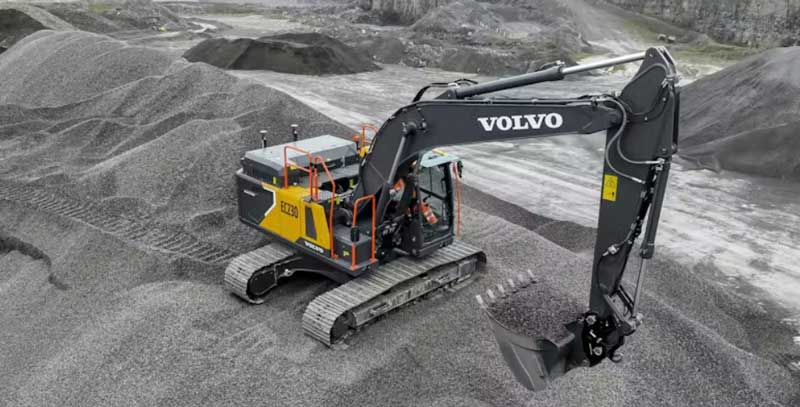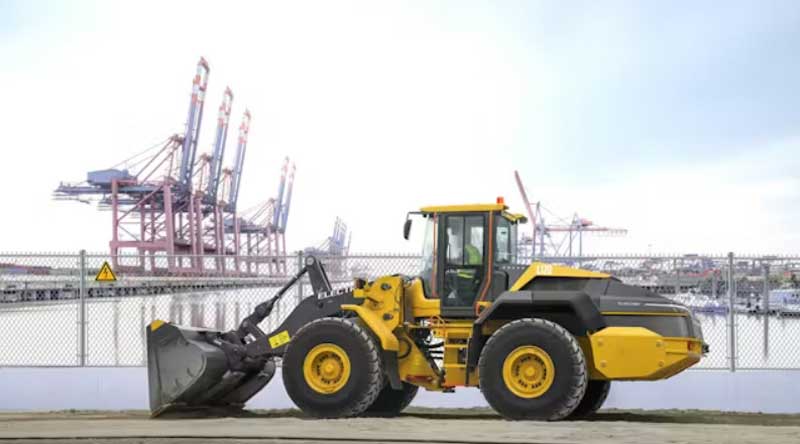In recent years, the construction industry has seen a significant shift towards sustainable technologies, and Volvo has made its mark by introducing electric alternatives to traditional heavy machinery. Two of their latest innovations, the Volvo EC230 Electric Excavator and the L120 Electric Wheel Loader, showcase the company’s commitment to reducing emissions without compromising performance. These mid-range machines are poised to compete fiercely in a market increasingly driven by alternative energy sources.
Volvo’s entry into this market, particularly with these models, marks a turning point, as more construction projects seek to minimize their carbon footprint while maintaining efficiency and power.
Volvo EC230 Electric Excavator: Performance and Autonomy
The EC230 Electric Excavator is designed to match the capabilities of its diesel counterpart, but with the added benefit of zero emissions. This makes it a highly attractive option for urban construction sites or projects with strict environmental regulations.
One standout feature is its reported 8 hours of operational time, though there are still questions about whether this duration applies under full load conditions or in more moderate work environments. From personal experience, it’s always critical to evaluate how electric machinery performs under high-stress situations, where maximum output is required. If the EC230 can deliver as promised, without the need for frequent charging interruptions, it could quickly become a best-seller in the heavy equipment market.
The excavator is also equipped with advanced battery technology, ensuring that operators can maximize efficiency and productivity throughout the workday. Additionally, Volvo has focused on making the transition to electric as seamless as possible, with controls and operation remaining similar to the diesel versions.

L120 Electric Wheel Loader: Innovation in Charging and Power
The L120 Electric Wheel Loader brings another level of practicality to Volvo’s electric lineup. One of the most compelling aspects of this machine is the mobile charging unit, designed to minimize downtime and keep productivity high. In construction, especially on uneven terrain or remote sites, the ability to quickly recharge a vehicle can be a game-changer.
In terms of performance, the L120 promises to match the same power and operational capabilities as its diesel equivalent. For heavy work, such as moving materials on rugged terrain, this wheel loader stands out. As someone who’s seen the challenges of maintaining uptime with traditional equipment, the introduction of efficient charging solutions is particularly appealing. If the mobile unit performs as advertised, reducing charging times significantly, this model will likely become a top choice for operators who demand reliability and speed.

Competition in the Electric Heavy Machinery Market
Volvo’s new models enter a rapidly evolving market where alternative energy solutions are gaining momentum. The EC230 and L120 are not just about offering electric alternatives; they’re about proving that electric machinery can match the power and endurance of traditional engines. Other brands in the sector are certainly taking notice, as Volvo’s approach sets a new standard.
Brands like Caterpillar and Komatsu are also developing their own electric alternatives, but Volvo’s emphasis on both performance and charging innovation gives them a competitive edge. The industry is watching closely to see how these new entries perform in real-world conditions, especially in comparison to their diesel counterparts.
Advantages of Transitioning to Alternative Energy in Heavy Machinery
The benefits of switching to electric machinery extend far beyond reduced emissions. For instance, lower maintenance costs and fuel savings are major incentives for companies to adopt electric solutions. Additionally, in projects where environmental impact is scrutinized, using electric equipment can improve compliance with regulations and attract clients focused on sustainability.
Volvo’s EC230 and L120 deliver on these fronts, making them ideal for forward-thinking construction companies aiming to reduce their carbon footprint while maintaining operational efficiency. Their quiet operation also allows for extended working hours in noise-sensitive areas, such as residential zones.
Don’t forget, we also offer a wide range of spare parts for heavy machinery, so feel free to inquire about any replacement needs you may have. Just click on contact us.
Impact of Volvo’s New Models on the Construction Industry
These new models from Volvo are poised to have a significant impact on the industry. With growing environmental pressures, the adoption of electric machinery could soon become the norm. The EC230 and L120 are part of a larger movement towards greener construction solutions, and as more companies recognize the cost savings and operational benefits, demand for electric equipment is likely to rise.
Volvo has clearly positioned itself as a leader in this space, and with the right marketing and competitive pricing, both models could set new benchmarks in the sector.
Challenges in Adopting Electric Machinery
Despite their benefits, the widespread adoption of electric heavy machinery still faces challenges. The initial costs for electric vehicles are often higher than for traditional machinery, and there are concerns about the longevity of the batteries in harsh working environments.
Additionally, the charging infrastructure for such machinery is still developing, which can pose logistical challenges on larger or more remote worksites. However, with Volvo’s mobile charging solution for the L120, they’re addressing these concerns head-on. Overcoming these challenges will be key to ensuring these models gain widespread acceptance.
The Future of Electric Heavy Machinery
In conclusion, Volvo’s EC230 Electric Excavator and L120 Electric Wheel Loader represent the future of heavy machinery. Their introduction signals a shift towards sustainable, efficient, and high-performing construction equipment. With features that rival their diesel counterparts and innovative solutions to minimize downtime, these models are well-positioned to succeed in a competitive market.
As the industry continues to evolve, it’s clear that the role of electric machinery will only grow. Volvo’s early move into this space, coupled with their focus on reliability and performance, ensures that they remain at the forefront of this transformation. Competitors will surely be taking note, and as battery technology improves and costs decrease, electric heavy machinery like the EC230 and L120 will likely become the new standard in construction projects worldwide.
